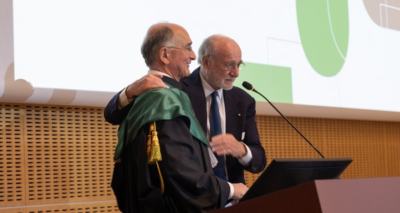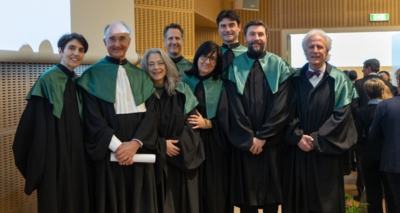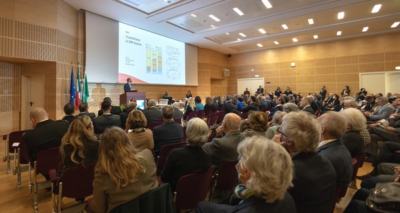Internationality, innovation, Precision Medicine and Wearables. Humanitas University opens the 2022/2023 Academic Year
Ensuring personalised care for a population with an increasing average age by focusing on prevention, genome analysis and wearable technological devices. Preparing the doctors, nurses and physiotherapists of the future for an increasingly interdisciplinary approach. These are some of the topics covered by Prof. Michael Snyder, director of the Department of Genetics at Stanford University School of Medicine, in his lecture held at the Pieve Emanuele Campus.
The opening of Humanitas University’s ninth academic year was held on Monday 6 March. The ceremony was also attended by the Mayor of Pieve Emanuele Pierluigi Costanzo, the Mayor of Milan Giuseppe Sala and the Lombardy region President Attilio Fontana.
The ceremony was an opportunity to reflect on the challenges laying ahead and on the year that has just gone by, during which the University saw a growth of its Life Sciences department as well as its international vocation, with now 38% of its students coming from abroad. In 2022 Humanitas University entered the Times Higher Education (THE) ranking for the first time, placing itself among the top 250 universities in the world out of 1799 universities analysed, and qualifying as the best new entry. It also ranks in the top 176-200 best medical universities. This confirms the university’s good performance in international rankings, as previously highlighted by Leiden CWTS and U-Multirank for 2022: the university is ranked first in the EU in terms of percentage of scientific publications, in the top 10% worldwide according to the Leiden CWTS Ranking, and eighth in Europe for its degree course in Medicine according to U-Multirank.
The University’s ninth year also marks the end of Prof. Marco Montorsi‘s rectorate.
“I could not be more proud to close the first nine years of our University’s life,” says Marco Montorsi, Rector of Humanitas University, “and to achieve the goals we had set ourselves. Our pre-and post-graduate teaching offer continuous to expand, and we can rely on our campus and university residences; our faculty and student community is constantly growing and is characterised by growing multiculturalism. Indeed, since the beginning, our educational project was strongly characterised by a focus on internationality, in order to give young people the opportunity to train and express themselves not only as professionals but also as humans, and to be able to bring back to society a truly open and multicultural experience.

As a University, we have the responsibility to create the best possible conditions for students to reach their final goal through programmes that raise the quality of teaching and improve the students’ focus. We strive to do so by providing greater autonomy and flexibility and by following models that are already present in other European countries, but also through a focus on the students’ physical and mental well-being. In order to meet the challenges that Medicine is facing, it has become crucial to open up to increasingly transdisciplinary pathways with some focus on specific Computer Science didactic projects in the field of Health Sciences. It is a process that will have to be supported by technology, hand in hand with advances in Artificial Intelligence, which is likely to become a major education tool in the coming years. Finally, we have seen how crucial it has become to activate inter-university collaborations at national and international level: I hope we can continue in this direction and thus demonstrate the competitiveness of the Italian academic system at European and global level’.
The Lectio Magistralis was given by Prof. Michael Snyder, Director of the Department of Genetics at Stanford University School of Medicine. Snyder has contributed to the development and dissemination of a widely used technology for the simultaneous analysis of thousands of genes, RNA molecules and proteins. Starting with studies on beer yeast and later expanding to humans, the professor set a high standard for the community and helped lay the foundation for systems biology. He also pioneered the application of omics technologies and big data to personalised medicine.
Prevention, also thanks to modern wearables, is the designated way to tackle the healthcare challenges of the future: the increase in the health needs of an increasingly elderly population and the sustainability of the system. Precision medicine, in fact, thanks to the analysis of big data by cross-referencing information on the genome with clinical, environmental and social information on each person, raises the issue of the sustainability of treatments, which can only be tackled by preventing the diseases for which it is possible to do so. Wearables can help with this: they are an example of a practical application of innovation in medicine. By encouraging physical activity and improving sleep, wearable technology devices can help people stay healthy and prevent the occurrence of disease conditions, reducing healthcare costs by around 20%.


